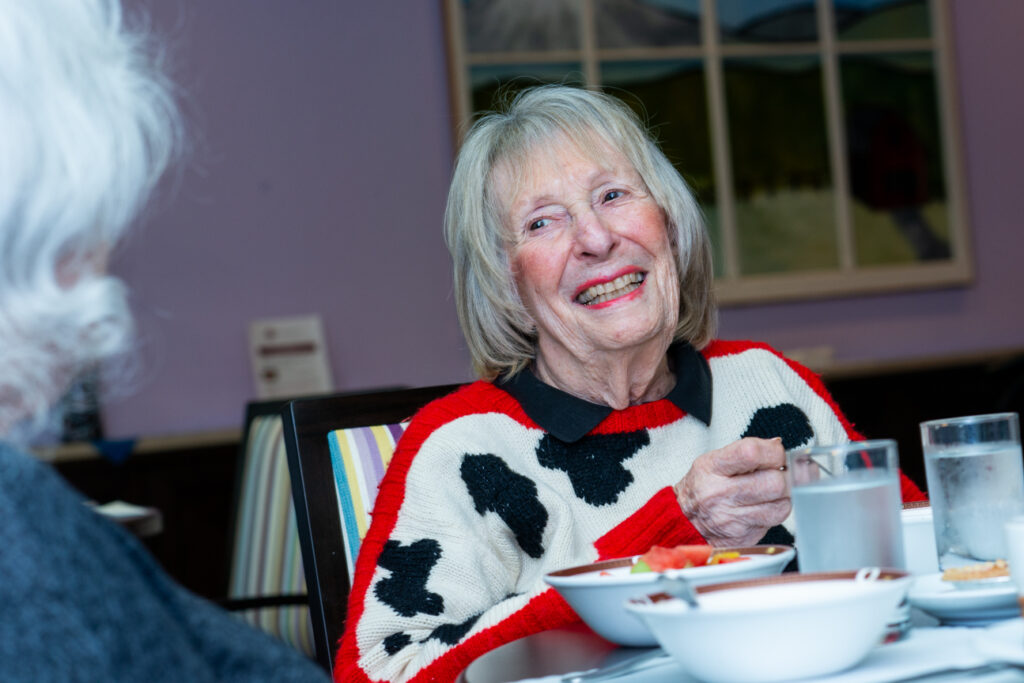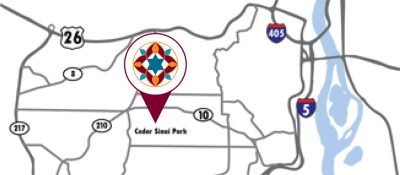By Sydney Clevenger
With food often foremost on many elders’ minds, the most common questions about senior living revolve around dining.
“Food is really important,” said Andrea ‘Andy’ Staggs, executive chef and director of culinary services for Cedar Sinai Park, the community that includes Rose Schnitzer Manor Assisted Living and Robison Jewish Health Center/Harold Schnitzer Center for Living.
“Dining is social time, and food is essential for nutrition. Many elders have dietary needs for good health. And then the cooking and sharing and eating of cuisine bring all kinds of memories for elders.”
Given the importance of food, Staggs has a few tips for elders and their families touring senior communities.
- Seek Meal Choices. Staggs says elders eyeing community living should look at how many food choices are offered per meal.
“There are some places where you are offered one dish per meal,” she said. “For some elders, one “choice” is fine, but others want a variety of options, so make sure to ask, so you don’t get bored with what is offered.
“At Rose Schnitzer Manor, for example, our menus change every week. We have multiple options per meal, and two specials of the day on top of those, plus a salad of the week, or a sandwich of the week. There is a lot of variety; more than what you would ever get going to the same restaurant every day.”
There should also be a good balance of healthy choices and fun choices, Staggs added.
- Are Dietary Needs Respected? It’s a good bet that a senior living community with gluten-free and low-sodium identifiers takes seriously elders needs for dietary restrictions, said Staggs.
“Elders will want to make sure they feel comfortable discussing any dietary challenges with the kitchen staff and those organizing the menu, so they get what they need at mealtime,” said Staggs. “As lifestyles and diets have changed, senior living kitchens need to change.
“We often provide counseling to residents who have specific instructions from their doctors about what they can eat, or should be avoiding, and those conversations are essential for person-centered care because they related to resident health and well-being. What one person can eat, not everyone else can eat.”
- When Can I Eat? Staggs says asking about the dining hours is a legitimate question. Many dining rooms are tightly scheduled as to when breakfast, lunch, and dinner are offered.
“Elders should take a look at the times dining is offered to see if they line up with when they might want or need to eat,” said Staggs. “And they should ask about whether there is food available to them in case the dining room is closed.”
For example, she said, there is always fruit, and often muffins and sandwiches and chips, available at Rose Schnitzer Manor between meals.
“Some communities are very strict about dining times, and what food is available between dining hours, and to dinner stragglers,” she said.
- Taste the Food! If an elder is on a tour, they should most certainly ask to sit down for a complimentary meal, said Staggs.
“It’s so important when you are on a senior community tour, to be treated as if you are a resident,” said Staggs. “Elders should be seated at a table and be able to order right off the menu, exactly as it is for that meal. When we have prospective residents with us, we give them the full dining experience, just as if they already live with us.
“There’s nothing like tasting the food to get a feel for whether dining at the community will appeal to your taste buds.”
###



